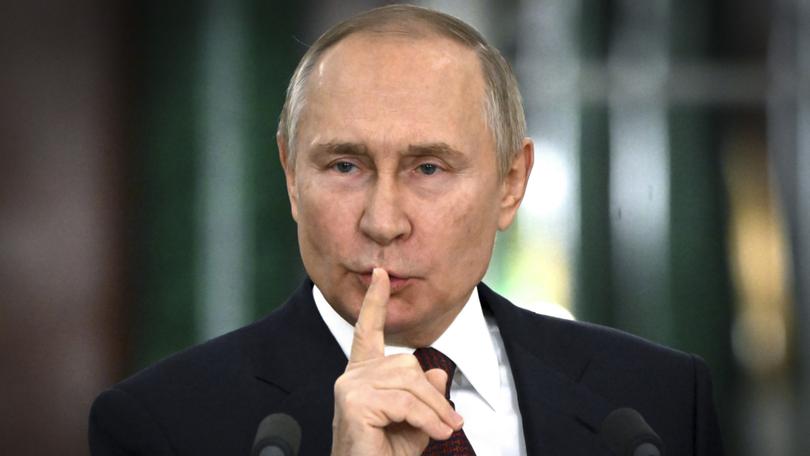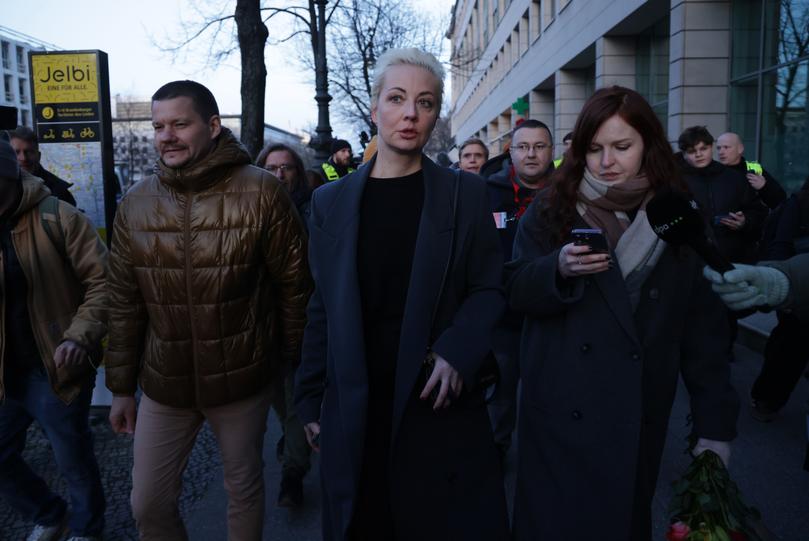Putin wins Russian election cementing his grip on power and overtaking Stalin
Voting on the last day of Russia's presidential election has been marked in part by protesters opposed to Vladimir Putin turning out at voting sites at noon.

President Vladimir Putin has won a record post-Soviet landslide in Russia’s election, cementing his already tight grip on power in a victory he said showed Moscow had been right to stand up to the West and send its troops into Ukraine.
Putin, a former KGB lieutenant colonel who first rose to power in 1999, made it clear Sunday’s result should send a message to the West that its leaders will have to reckon with an emboldened Russia, whether in war or in peace, for many more years to come.
Sign up to The Nightly's newsletters.
Get the first look at the digital newspaper, curated daily stories and breaking headlines delivered to your inbox.
By continuing you agree to our Terms and Privacy Policy.The outcome means Putin, 71, is set to embark on a new six-year term that will see him overtake Josef Stalin and become Russia’s longest-serving leader for more than 200 years if he completes it.
Putin won 87.8 per cent of the vote, the highest ever result in Russia’s post-Soviet history, according to an exit poll by pollster the Public Opinion Foundation (FOM). The Russian Public Opinion Research Centre (VCIOM) put Putin on 87 per cent. First official results indicated the polls were accurate. The United States, Germany, the United Kingdom and other nations have said the vote was neither free nor fair due to the imprisonment of political opponents and censorship.
Communist candidate Nikolai Kharitonov finished second with just under four per cent, newcomer Vladislav Davankov third, and ultra-nationalist Leonid Slutsky fourth, partial results suggested.

Putin told supporters in a victory speech in Moscow that he would prioritise resolving tasks associated with what he called Russia’s “special military operation” in Ukraine and would strengthen the Russian military.
“We have many tasks ahead. But when we are consolidated - no matter who wants to intimidate us, suppress us - nobody has ever succeeded in history, they have not succeeded now, and they will not succeed ever in the future,” said Putin.
Supporters chanted “Putin, Putin, Putin” when he appeared on stage and “Russia, Russia, Russia” after he had delivered his acceptance speech.
Inspired by opposition leader Alexei Navalny, who died in an Arctic prison last month, thousands of opponents protested at noon against Putin at polling stations inside Russia and abroad.
Putin told reporters he regarded Russia’s election as democratic and said the Navalny-inspired protest against him had had no effect on the election’s outcome.
In his first comments on his death, he also said that Navalny’s passing had been a “sad event” and confirmed that he had been ready to do a prisoner swap involving the opposition politician.
When asked by a NBC, a US TV network, whether his re-election was democratic, Putin criticised the US political and judicial systems.
“The whole world is laughing at what is happening (in the United States),” he said.
“This is just a disaster, not a democracy.”
“... Is it democratic to use administrative resources to attack one of the candidates for the presidency of the United States, using the judiciary among other things?” he asked, making an apparent reference to four criminal cases against Republican candidate Donald Trump.

The Russian election comes more than two years since Putin triggered the deadliest European conflict since World War II by ordering the invasion of Ukraine.
Nationwide turnout was 74.22 per cent when polls closed, election officials said, surpassing 2018 levels of 67.5 per cent.
There was no independent tally of how many of Russia’s 114 million voters took part in the opposition demonstrations, amid tight security involving tens of thousands of police and security officials.
At least 74 people were arrested on Sunday across Russia, according to OVD-Info, a group that monitors crackdowns on dissent.
The West casts Putin as an autocrat and a killer. Ukrainian President Volodymyr Zelenskiy said on Sunday that Putin wanted to rule forever and that the vote had been illegitimate.
Putin portrays the war as part of a centuries-old battle with a declining West that he says humiliated Russia after the Cold War by encroaching on Moscow’s sphere of influence.
Russia’s election comes at what Western spy chiefs say is a crossroads for the Ukraine war and the wider West.
Support for Ukraine is tangled in US domestic politics ahead of the November presidential election.
Though Kyiv recaptured territory after the invasion in 2022, Russian forces have made gains after a failed Ukrainian counter-offensive in 2023.
with DPA
